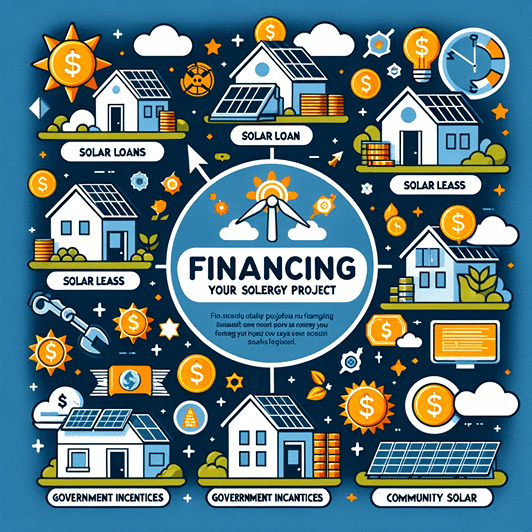Introduction
The decision to switch to solar energy is a smart investment in both the environment and your financial future. However, the initial cost of solar panel installation can be a significant barrier for many. Understanding your financing options is key to making solar energy accessible. This blog post explores various ways you can finance your solar energy project, along with helpful advice to guide you through the process.
1. Solar Loans
Solar loans are a popular financing option. They allow you to borrow the necessary funds to purchase and install solar panels and then pay back the loan over time. Solar loans come in various forms, including secured, unsecured, and home equity loans, each with its own terms and interest rates.
2. Solar Leases and Power Purchase Agreements (PPAs)
With a solar lease or a PPA, you can rent the solar system or agree to purchase the power it produces at a set price per kilowatt-hour. These options usually involve no or minimal upfront costs and can be an excellent way to go solar without a large initial investment.
3. Government Incentives and Rebates:
Many governments offer incentives, rebates, and tax credits for solar panel installations. These can significantly reduce the overall cost of your solar energy project. It’s important to research what’s available in your area and how these incentives can be combined with other financing options.
4. Solar Renewable Energy Certificates (SRECs):
In some regions, solar panel owners can earn SRECs for the electricity their system generates. These certificates can then be sold to utility companies, creating an additional revenue stream to help offset the cost of the solar system.
5. Community Solar Projects:
If individual solar panel installation is not feasible, community solar projects can be an alternative. Participants can either purchase a share of a community solar garden or subscribe to a portion of its energy output, enjoying the benefits of solar power without the need for installation on their property.
6. Considerations for Choosing the Right Financing Option:
When selecting a financing option, consider factors like the total cost over time, your current financial situation, the potential savings on energy bills, and the length of the financing term. Consulting with a financial advisor can provide personalized insights based on your specific circumstances.
Conclusion:
Financing a solar energy project can be a complex process, but with the right information and careful planning, it’s possible to find a solution that works for you. By exploring and understanding the various financing options available, you can make your dream of going solar a reality.
For more information on financing solar energy projects, visit www.GoSolarGlobal.com.


